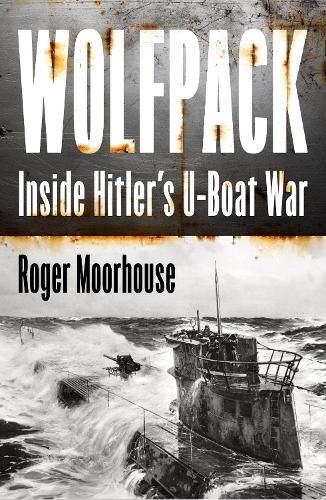
Wolfpack: Hitlers U-boat War 1939-45
(Hardback)
Publishing Details
Wolfpack: Hitlers U-boat War 1939-45
By (Author) Roger Moorhouse
HarperCollins Publishers
William Collins
30th December 2025
9th October 2025
United Kingdom
Classifications
General
Non Fiction
Modern warfare
Naval forces and warfare
Physical Properties
Hardback
416
Width 159mm, Height 240mm, Spine 29mm
270g
Description
A landmark history of the U-Boat war told through the experiences and recollections of the U-Boat crews themselves.
Winston Churchill famously remarked that the threat of the German U-Boats was the only thing that had really frightened him during World War Two. The U-Boats certainly claimed a bitter harvest among Allied shipping: nearly 3,000 ships were sunk, for a total tonnage of over 14 million tonnes, nearly 70% of Allied shipping losses in all theatres of the war. With justification, then, they are an integral part of the traditional narrative of the Battle of the Atlantic; a story of technological brilliance, dramatic sinkings, life and death, and of course the sinister, unseen threat of the U-Boats themselves.
For Allied seamen during the war, the U-Boat was a hidden menace, a faceless killer lurking beneath the waves; and the urgent needs of survival afforded them little time or energy to consider the challenges and privations of their enemy. History, however, affords us that time and energy, and any pretence of comprehensiveness demands that we consider what life was like for the crews of those most claustrophobic vessels; packed into a steel hull, at the mercy of the enemy, of the elements and of basic physics.
Germanys U-Boat crews posted the highest per-capita losses of any combat arm during World War Two. Some 30,000 German submariners were killed over 75% of the total number deployed the vast majority of whom have no grave except the seabed. Using archival sources, unpublished diaries and existing memoir literature, this book will give the U-Boatmen back their voice, allowing their side of the narrative to be aired in a comprehensive manner for the first time.
With that testimony, Wolfpack takes the reader from the heady early days of the war, when U-Boat crews were buoyed with optimism about their cause, through to the challenges of meeting the Allied counterthreat, to the final horror of defeat, when their submarines were captured by the enemy or scuttled in ignominy. Using the U-Boatmens own voices to punctuate an engaging narrative, it tells their story; of courage, certainly, but also of fear, privation and ultimately failure.
Reviews
EARLY PRAISE FOR WOLFPACK
'Roger Moorhouse is becoming a major authority in his field. Wolfpack is a significant contribution and rightly places the U-boat campaign at the heart of Germanys strategy during the Second World War. Compellingly written, he seamlessly blends fascinating technical detail with human experience often profoundly moving and authoritative strategic insight. Wolfpack is a superb work of history'
James Holland
'A thrilling account from a master of Second World War history'
Dan Snow
PRAISE FOR THE FORGERS:
The Forgers is a well-constructed and agreeably concise book with a clear narrative drive and fascinating detail Moorhouse's most laudable achievement is the light he shines on Lados and his team, who saved at least 2,000 Jews from extermination. Until now, they have not received the recognition they deserve Gerard de Groot, The Times
Among the many remarkable aspects of The Forgers is the fact that the prime movers were Poles, many of whom were notorious for antisemitism [Moorhouse] does well to highlight that some Poles displayed admirable compassion Max Hastings, Sunday Times
Roger Moorhouse, the leading historian on Poland's war, publishes a full account of Lados's efforts in an excellent book on the passport ring Daniel Finkelstein, The Times
Absorbing It is a story that seems not to have been told much outside the academic literature, and it is deeply researched and well reported here Spectator
In this fascinating book, Roger Moorhouse shines a light on extraordinary, audacious and little-known rescue operation Mail on Sunday
Author Bio
Roger Moorhouse is a historian and author specialising in Nazi Germany, Poland and World War Two in Europe. After studying history at the School of Slavonic and East European History, London University, Roger graduated with an MA in 1994. Thereafter, he worked as researcher for Professor Norman Davies for many years, co-authoring with him the history of Wroclaw (Breslau) Microcosm: Portrait of a Central European City, which was published in three languages in 2002.
A fluent German speaker, Roger is a specialist in modern German and Polish history, particularly the Third Reich and World War Two. He has written a number of books in this capacity, including Killing Hitler (2006), Berlin at War (2010), The Devils Alliance (2014) and the critically acclaimed First to Fight (2019), which was awarded the Polish Foreign Ministry History Prize in 2020. Rogers books have appeared in more than 20 languages.
